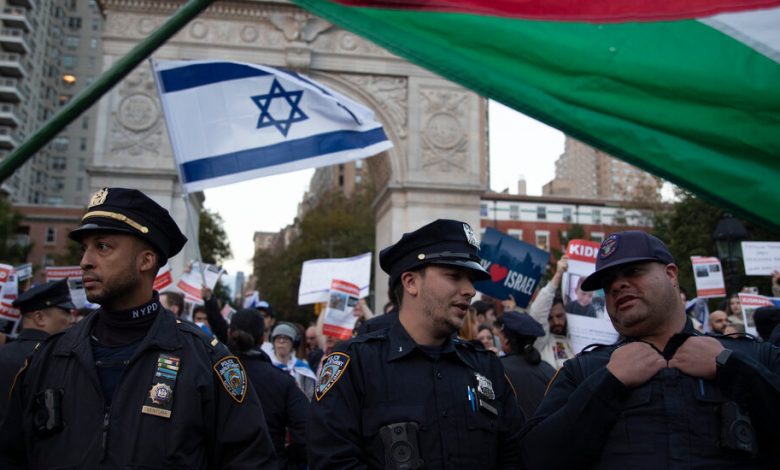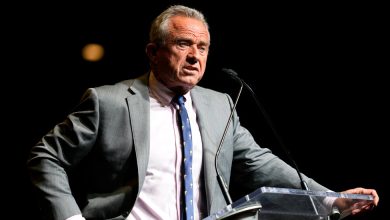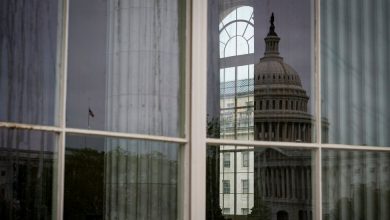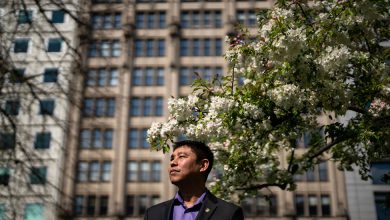Americans, Weary of Foreign Conflicts, Face Another

Since the Hamas attack on Israeli citizens two weeks ago and Israel’s subsequent bombing campaign on Gaza, protesters have flooded American streets. Emotional debates have deeply unsettled Jewish and Palestinian communities here and divided college campuses. Threats against synagogues and mosques have spiked, and a 6-year-old Palestinian-American boy in Chicago was stabbed to death.
On Thursday, President Biden asked Americans to stand with Israel in its war against Hamas, and with Ukraine in its war against Russia. He warned that “we are facing an inflection point in history” and is pitching a $105 billion military aid package to help American allies.
Most Americans see the connection between the well-being of their country and Ukraine and Israel. In a poll released by Quinnipiac on Tuesday, nearly two-thirds of voters said supporting Ukraine was in the national interest, and more than three-quarters felt that way about supporting Israel.
But in dozens of interviews in key swing states, many also expressed trepidation as they considered the widening conflicts in the Middle East and Europe. Some questioned how deeply the country should be involved.
Their thoughts — a snapshot in time — reflect the polls but also this nation’s own considerable fractures after nearly a decade of partisan rage, pandemic grief and the open hostility of the Trump years.
Disgusted with the political process and chastened by a chaotic withdrawal from a bruising 20-year war, many said their impulse was to turn inward, away from mounting international tensions and toward problems, such as inflation, that are closer to home.
Georgia
At Manuel’s Tavern, a historic hangout in Atlanta’s Poncey-Highland district, the barroom screens were on mute as the president addressed the nation. (Some 20 million people watched President Biden’s prime time address Thursday on major television networks, according to data from Nielsen — half as many as tuned into Donald Trump’s 2019 prime time address on border security.)
Sitting with his back to the television, William Miller, 50, did not need to listen to the president to question the policy of more foreign involvement.
“Why isn’t he talking about the homeless problem or gang violence?” Mr. Miller, an entrepreneur, asked. “Why aren’t people noticing what’s going on around them? We’re at war with ourselves.”
Nearby, Anthony Begando, 56, a former Army medic who refers to himself as a “hard-core centrist,” said “we have to stand by our allies.” Still, he worried that more U.S. military aid will only escalate the Middle East conflict and overshadow what he fears is the far more frightening war between Russia and Ukraine. “Russia,” he said, “has to lose.”
At another table, Tim Young agreed. “We have enough money” to help Israel and Ukraine, said Mr. Young, 57, enjoying cocktails with his husband. “And if we don’t spend it over there, we’re going to have similar problems here.”
Though he does not think American troops will be necessary, he said he would even support sending them to the Middle East if the conflict worsens.
“I think we should support and defend democracies that are under attack,” he said. “We can’t turn a blind eye to the rise in authoritarianism around the world.”
Wisconsin
In rural Lone Rock, Wis., where harvest season had meant yet another long workday on Thursday, Randy Schmidt, 60, a dairy farmer, said the president’s appeal for military aid was “going to be a hard sell in these parts.”
Mr. Schmidt ownsthe largest dairy farm in Richland County, a swing district that had voted for the winning presidential candidate in every election since 1980, until 2020, when voters there went for former President Trump’s re-election.
“I mean, money comes hard here,” Mr. Schmidt said. “It’s been a relatively tough year of farming for us. I think as a country, we do support Israel, but I couldn’t believe we can do that much.”
In suburban Milwaukee, however, the questions posed by the violence in the Middle East and Ukraine were less economic than moral for Janet Lucas. The terrorist attacks by Hamas against Israelis, in particular, were triggering for her, she said.
“I understand that there has been a fight between the two for years and years,” said Ms. Lucas, 58. “But the way that it was handled recently, my heart just broke of the devastation,” she said of the Hamas killings and kidnappings of Israeli families. “It took me back to 9/11 — the same feeling, the same fear of, you know, is it going to happen to us, or who’s next?”
On Friday she went to Holy Hill, a basilica on a forested hillside, a country drive away from her community, Brookfield, to take in the fall colors with her son, Michael, 25, who was in town from Tampa, Fla. As African Americans, they said, they felt conflicted about the president’s call to side with Israel. They could not condone terrorist attacks, they said, but sympathized with Palestinians and what they see as the long discrimination they have endured.
“There are times when I sit in the middle, because I can see both sides of it,” Janet Lucas said. “And then I also think, is there another way, could the United States or any other country get involved to help them to come to some form of peace?”
Pennsylvania
“We’ve got two wars going, everything’s screwed up; now we’ve got to give money to Israel? We’ve got to give money to Ukraine?” Albert Altenburger, 85, did not mince words on Friday morning as he digested his lunch — a slice of pizza and most of a cup of coffee — in the food court of the Neshaminy Mall just outside Philadelphia.
A thrice-retired police officer, security guard and Postal Service employee, Mr. Altenburger, a Trump supporter, said he also supported Israel and believed in sending a reasonable amount of money and equipment to the country. But the thought still rankled him: “We’ve got to take care of the whole world?”
At a nearby table, Ceil Dixon, 59, a former child care provider and animal rescue worker who was born and raised in Bucks County, Pa., said she largely tried to avoid politics and the news, which she finds both depressing and, often, misleading. But she could not help thinking, she said, of how much good could be done in her own state with those billions of dollars Mr. Biden has proposed sending to Israel and Ukraine.
Matthew Williams, 30, a Bronx native who now lives in Philadelphia and who was strolling through the mall with headphones, shared her skepticism. Before sending money elsewhere, he said, Mr. Biden should be spending as much money as possible on trying to reduce homelessness and solve the opioid crisis.
But Max Assaraf, 35, a moderate Democrat, said he viewed sending money to Ukraine and Israel as necessary, even as he also feared that a rise in the conflict could lead to a world war.
“If you start losing this influence in the world, you’re going to have issues,” he said, adding that aid to Israel and Ukraine would be a bargain if it helps keep the world secure in the longer term.
Arizona
Candice Fremouw, 67, who spends her retirement doing volunteer work for local public schools in Phoenix, said that former President Trump’s politics of angry division bore at least some blame for the turmoil in the Middle East as well as the bitter rhetoric in the United States between supporters of Israel and Gaza.
“There’s just so much more hatred, and it’s spilling into our streets,” she said.
But Ms. Fremouw, who voted for Mr. Biden and plans to support him again, said she has tuned out daily news from the Middle East. She fractured several vertebrae recently, she said, and has had to prioritize where to spend her emotional energy. She has chosen schools, Phoenix’s homeless crisis and her own recovery.
“I’m helpless, I can’t do anything about it,” she said. “I just have to choose what I’m surrounding myself with.”
Less sympathetic to the White House or foreign allies was Nick Schaefer, 26, who was watching the Arizona Diamondbacks notch a playoff win against the Philadelphia Phillies on Thursday as Mr. Biden delivered his address.
“I’m in the United States,” he said, shouting an anti-Biden curse into the 103-degree Phoenix heat as he walked out of the stadium with a few friends. “America can’t save everybody.”
Outside a nearby Irish pub, Jim Austin, 62, a fellow Trump supporter who said he remodels hotels and gets his news from the conservative media outlet Real America’s Voice, said he supported American military aid to Israel and regretted once cheering the ouster of former House Speaker Kevin McCarthy at such a dire juncture.
“Hamas has to go,” he said. “They’re cruel people. They have no compassion. They’re evil.”
His comments echoed some of Mr. Biden’s points over the past two weeks, but Mr. Austin said he blamed Mr. Biden in part for the attack by Hamas, as well as Russia’s invasion of Ukraine. He believed Mr. Trump’s swagger and threatening rhetoric had kept a lid on hostile world leaders. Now, he said, Mr. Biden’s weakness has invited war and chaos and “people don’t fear us.”
The attack by Hamas underlined his worries over thousands of migrants from around the world who have crossed America’s southern border. He said he stocked up on ammunition and owns three assault-style rifles “in case a bad day happens.”
Like the president, he saw this as a pivotal moment for the nation. And, he said, “It’s going to get worse.”




